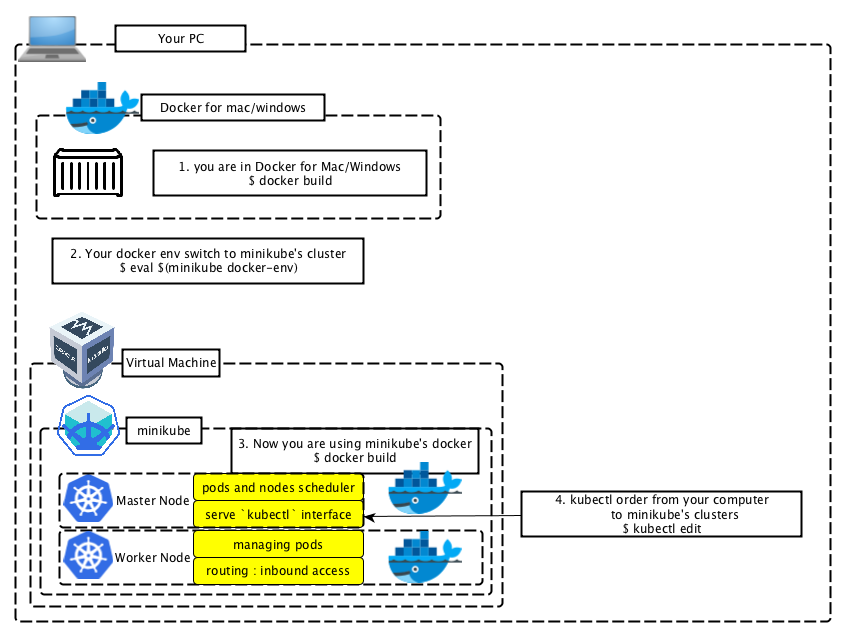Create Development Environment with Kubernetes Clusters in your mac (with MySQL, ElasticSearch)
Posted: Jun 11, 2018
I created development environment in minikube. I took some times to setup keep Volume in own machine.
Finally, I created NFS in my mac and k8s volume mount to it. This article only about macOSX. You have to create shared folder in your VM if you use windows.
Versions
- Docker : v18.03.1-ce-mac65
- kubectl (Client) : v1.10.2
- kubectl (Server) : v1.10.0
- minikube : v0.27.0
- VirtualBox or so on...
- skaffold : v0.6.0
- nfsd : Network File System
Image

Commands
Setup NetworkFileSystem
in macOS
$ sudo mkdir /Users/Shared/mysql
$ sudo chmod 777 /Users/Shared/mysql
$ sudo vi /etc/exports
# add following lines
/crm/mysql -maproot=root:mysql -network 192.168.99.0 -mask 255.255.255.0
$ sudo nfsd update
$ sudo showmount -e
Exports list on localhost:
/Users/Shared/mysql 192.168.99.0
/Users/Shared/elasticsearch 192.168.99.0192.168.99.1 is minikube's IP address in MacOS. I added access permission from minikube.
start VM and minikube
$ minikube start --disk-size 20g
$ minikube status
minikube: Running
cluster: Running
kubectl: Correctly Configured: pointing to minikube-vm at 192.168.99.100Create pods with skaffold
$ skaffold dev
Starting build...
Found [minikube] context, using local docker daemon.
Sending build context to Docker daemon 25.67MB
Step 1/5 : FROM php:7.1-fpm
---> 11517dccf6fd
Step 2/5 : RUN apt-get update && apt-get install -y libmcrypt-dev mysql-client git && docker-php-ext-install mcrypt pdo_mysql && apt-get clean; rm -rf /var/lib/apt/lists/* /tmp/* /var/tmp/* /usr/share/doc/*
---> Using cache
---> 3ab2884fb363
Step 3/5 : COPY ./main /var/www
---> Using cache
---> 7dcd45befe33
Step 4/5 : RUN chmod -R 777 /var/www/storage
---> Using cache
---> 28c46963494d
Step 5/5 : WORKDIR /var/www
---> Using cache
---> dd39afe581c9
Successfully built dd39afe581c9
Successfully tagged 11b3344bd05b3589691ba369cbd6ecf9:latest
Successfully tagged api-bizcrm:dd39afe581c911ae0a319282f57b6649db16c2e7efafac50c6676a554b9fa657
Build complete in 2.690496822s
Starting deploy...
service "api-http" created
deployment.extensions "api-http" unchanged
Deploy complete in 192.537363ms
Watching for changes...check your pods' status :
$ kubectl get po
NAME READY STATUS RESTARTS AGE
api-http-779f4558cb-5zntl 3/3 Running 0 15m
api-mysql-86cf68bfdb-hltnn 1/1 Running 1 44mor you can check on GUI : minikube dashboard
- for minikube's driver
skaffold build containers when you changed project files. You should wait a second after saving file.
[api-http-779f4558cb-5zntl api] [09-May-2018 17:30:34] NOTICE: ready to handle connectionsIf you don't wanna use skaffold
You can develop without skaffold to following steps :
$ cd /path/to/api-bizcrm
$ eval $(minikube docker-env)
$ export VERSION=<set your version>
$ docker build -f Dockerfile.minikube -t api-bizcrm:$VERSION .
$ kubectl set image deployment/api-http api=api-bizcrm:$VERSION
deployment.apps "api-http" image updatedbut I think it's too tedious process to develop.
